IAS Critical Area Studies Funded Projects announced
10 April 2024
In 2024 the IAS offered a one-off fund to foster research, public engagement and/or innovative pedagogy in any field of critical area studies (CAS). Below you can find details of the recipients and their projects.

- Techno-Urban Atlas: Mapping Inter-Asian Transformations in Hsinchu, Taiwan and Chennai, India
- Imagining “the West”: An Interdisciplinary Workshop on the Portrayals of “the West” in Eastern Europe
- ‘South Asia’ + ‘Middle East’’ + Early Modern’ = ?
- Precarity in urban China: surviving in capitalist ruins
- ‘Traversing beyond Borders: Intermediality and Cross-Cultural Communication’ PG Conference
- Infrastructure Soundscapes
- Children’s Letters for Palestinian childhoods
- Indigeneity and Art in the Himalayas
Techno-Urban Atlas: Mapping Inter-Asian Transformations in Hsinchu, Taiwan and Chennai, India
Dr Pushpa Arabindoo, Geography; Dr Leah Lovett, Centre for Advanced Spatial Analysis, Bartlett; Richard Müller, Geography
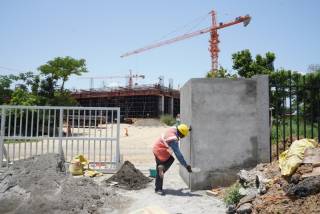
This project will facilitate two public engagement workshops in Chennai and Hsinchu and the creation of a web-based Techno-Urban Atlas to bear witness to and promote inter-Asian comparison regarding the socio-spatial reconfigurations emerging within these urban areas. The workshops will be in collaboration with local cultural organisation partners, the Chennai Photo Biennale and Hsinchu City Art-Site. The workshops will train participants in 3D-scanning methods before venturing on a walking tour through key techno-industrial areas within Chennai and Hsinchu. The participants will 3D-scan sensorial traces, surfaces, and artifacts of the urban landscapes which will then be aggregated into the public Techno-Urban Atlas website.
Imagining “the West”: An Interdisciplinary Workshop on the Portrayals of “the West” in Eastern Europe
Dr Jessie Barton Hronesova, SSEES; Dr Jelena Calic, SSEES; Prof Eric Gordy, SSEES

To be held on 7 June 2024 at SSEES.
‘South Asia’ + ‘Middle East’’ + Early Modern’ = ?
Dr Jagjeet Lally, History; Dr Seth Anziska, Hebrew & Jewish Studies, Prof Tariq Jazeel, Geography
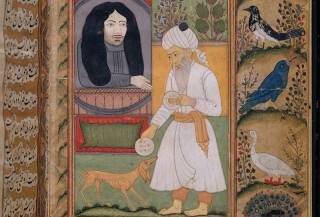
See event page, 21 June 2024 in the IAS Forum
Image: https://www.metmuseum.org/art/collection/search/453673
Precarity in urban China: surviving in capitalist ruins
Dr Alison Lamont, Social Research Institute, IOE; Dr Annabella Massey, Education Practice and Society, IOE
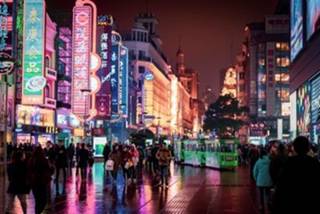
This half-day workshop uses Anna Tsing’s (2015) The Mushroom at the End of the World: On the Possibility of Life in Capitalist Ruins as a gateway to invite participants to explore these local conditions, particularly in connection to the idea that people are currently piecing together lives and meaning in the “ruins” of capitalism. Tsing’s concept of capitalist ruins invokes images of what is left behind in the wake of capitalist advancement and reminds us that capitalism has boundaries and externality, domains of non-capitalist experience which capitalism itself scavenges for the accumulation of value. Tsing uses her ethnographic “art of noticing” to illuminate the areas of life from which capitalism scours resources, noting that they are often created within the ruined remains of capitalism’s own processes.
We therefore invite researchers to think of their work in China’s cities and distinct model of capitalism in connection to Tsing’s notions of “salvage accumulation”, and to explore the “landscapes of unintentional design” that rapid development leaves behind, while also drawing attention to the global pull of supply chains and markets. Ranging from lived experiences of precarity and informal work and social media livelihoods, to urban exploration, to urban planning policy, through to play and rebellion in the city, the workshop aims to highlight the Chinese city as both a space of precarity and a space made up of creative responses to that precarity.
To be held on 21 June in the IAS Common Ground
‘Traversing beyond Borders: Intermediality and Cross-Cultural Communication’ PG Conference
Serena Pei, SELCS; Gefan Wang, King’s College London
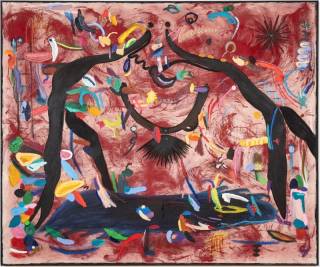
We are enormously delighted to announce that we have invited London-based Turkish artist Merve İşeri to be our keynote speaker, whose creation is based on the unique understanding of immigration, displacement of identity, cross-cultural experience, and memory. For more information about İşeri’s works, please see her website: https://www.merveiseri.com/
To be held on 31 May in the IAS Common Ground. View the call for papers
Image credit: ‘Sev Kardesim’* (love, sister and brother) by Merve İşeri (2021). Oil, pastel, acrylic, and pigment spray paint on canvas. * The painting’s title alludes to the song of the same name by Turkish singer Şenay.
Infrastructure Soundscapes
Dr Igor Rogelja, EISPS; Manca Bajec, Goldsmiths University of London; ZRC SAZU, Research Centre of the Slovenian Academy of Arts and Sciences
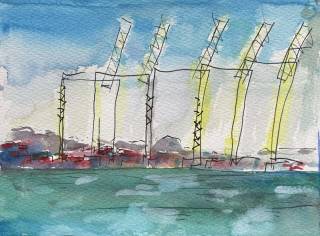
The artistic intervention will consist of a continuous recording of soundscapes along the route, but also two 'stopping points' in Trieste, where the artist will consider how infrastructures that have lost their original purpose come to occupy a space of cultural identity. Considering the methodological approach of interviewing objects and images, we will be interviewing the buildings in question in relation to the sounds of untold and often repeated histories. The project will produce a soundscape map and essay, hosted on the project’s digital portal Footnotes.
Presented at IAS in early summer 2024.
Image credit: Silas Capps
Children’s Letters for Palestinian childhoods
Prof Rachel Rosen, Social Research Institute, IOE; Dr Feryal Awan, Culture, Communicatin and Media, IOE; Osama Al-Azza, Palestinian storyteller and actor
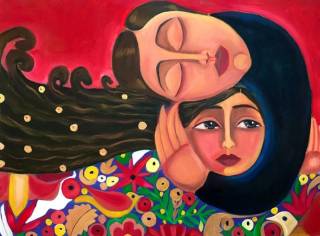
The project is an extension of Letters for Palestinian Childhoods, which is a response to a global call to action by childhood studies scholars and students, who demanded an immediate ceasefire and called on people to stand in solidarity and counter the dehumanisation of Palestinian children and adults. The result was a coming together of international academics and artists, who used their area studies knowledge to build an online (website / Instagram) and travelling exhibition.
Image credit: Shelter, by Malak Mattar (2021)
Indigeneity and Art in the Himalayas
Sangita Thebe Limbu, Institute for Risk & Disaster Reduction; Mridu Rai, Anthropology

Our project aims to bring together artists and researchers from Nepal and India to share their experiences of working on issues of identity and collective rights in the eastern Himalayas. In doing so, we will critically reflect on Indigenous storytelling, knowledge production and methodologies, and the contested discourse on Indigeneity in Asia.
Through a one-day event comprised of film screening, a shadow play, a photo exhibition and a panel discussion, the project aims to create a safe and collaborative space where artists, storytellers, researchers, community mobilisers can come together to network, learn from one another, and co-produce shared agendas and approaches.
 Close
Close

